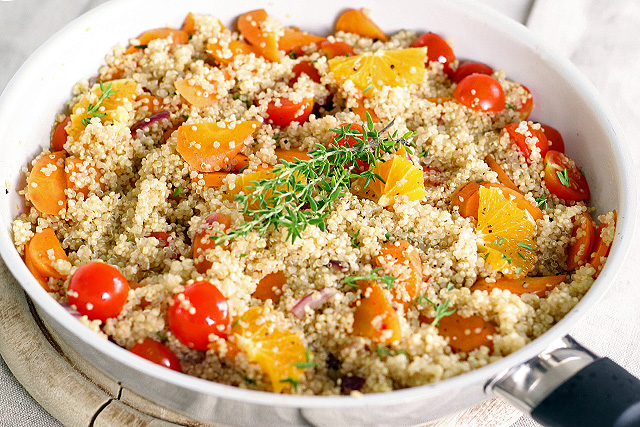Here is an interesting question on carbohydrate sources for athletes, sent by a reader, with a reply by our dietitian Clare Wood
Q. Hi Clare, I've just read with interest your articles on pre work out nutrition etc. Recently there has been a lot of articles around cutting out sugar in diets for athletes and relying more on healthy fats, protein and carbs such as fruits and veg - I've been following a lot of the Teresa cutter menus - swapping breads for quinoa etc - cutting out jacket potatoes for sweat potatoes etc -but initially I feel a bit flat at times while training. I play national level squash and county level golf so I'm extremely active. Should I be eating more hi GI carbs such as pasta before matches rather than quinoa - or will the body get used to the change in what seems a healthy diet? Regards, Frank Ellis.
A. Hi Frank, You have asked a really great question.
General nutrition guidelines recommend that we eat more high-fiber, low GI foods and less refined carbohydrates. This is good and reliable advice, staying healthy is important. For an athlete, however, this can result in what you describe, low energy levels.
This is mainly as a result of a lowering of your total carbohydrate content.
There may be 2 reasons for this.
- High fiber and low GI foods are more filling and you may tend to eat a little less than normal without realizing, as you are more satisfied.
- Changing your dietary intake and removing 'reliable' carbohydrate foods like bread may reduce the carbohydrate ratio in the diet.
So the solution to this would be to monitor how much you are consuming and see if you are still meeting the guidelines for carbohydrate requirements for your training needs. For someone who trains daily I would be recommending perhaps (without seeing your training program) 5-6 g of carbohydrate per kilogram body weight.
You can determine how much you are eating by doing a food diary and recording everything you eat, and then looking at labels to determine carbohydrate content of certain foods. Otherwise look up a resource online that may help you. Then you can determine if you are meeting your needs for carbohydrate requirements.
 swapping breads for quinoa may reduce your energy levels
swapping breads for quinoa may reduce your energy levelsOn saying all that though, there has been some evidence to show that higher GI foods can be beneficial to muscle recovery and glycogen replenishment, as they more quickly get into the blood stream and uptake into the muscle rapidly giving a more active recovery. So higher GI foods are not 'off-limits' for athletes, just preferentially use them for post training snacks.
Another potential issue with really high fiber foods is if you eat them prior to a tough training session. High fiber foods are heavy on the stomach and require a lot of energy and blood supply for digestion. To eat these foods immediately prior to training you are taking the risk of reduced blood supply to the muscles during training, and possibly an upset stomach. It does depend on how soon prior to training you eat.
I hope this has helped a little, Good luck,
Clare
Related Pages
- More about Pre-Exercise Nutrition
- More about carbohydrates and athletes


 Current Events
Current Events